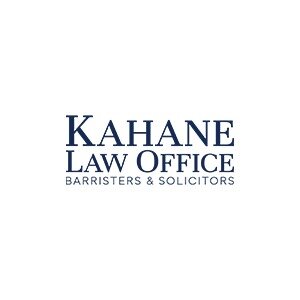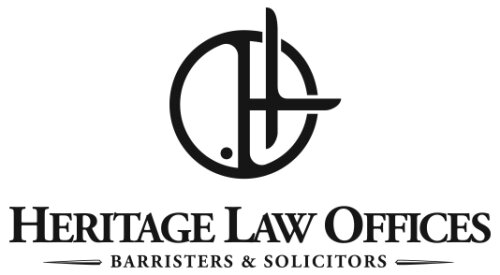Best Renewable & Alternative Energy Lawyers in Edmonton
Share your needs with us, get contacted by law firms.
Free. Takes 2 min.
List of the best lawyers in Edmonton, Canada
About Renewable & Alternative Energy Law in Edmonton, Canada
Renewable and alternative energy law in Edmonton, Canada is an evolving field that deals with the legal frameworks surrounding clean energy sources such as solar, wind, hydro, biomass, and geothermal. As Canada continues its transition toward a low-carbon economy, Edmonton has become an important hub for the adoption of renewable energy technologies. The legal landscape covers project development, regulatory compliance, property rights, environmental impact assessments, permitting, and incentives for both commercial and residential projects. Understanding these legal aspects is crucial for individuals, businesses, and organizations involved in the generation or use of renewable energy in Edmonton.
Why You May Need a Lawyer
There are several situations where hiring a lawyer specializing in renewable and alternative energy law is advisable. Some common scenarios include:
- Navigating the complex permitting and approval process for installing solar panels or wind turbines on your property
- Understanding regulations affecting new renewable energy businesses or startups
- Negotiating or drafting contracts such as Power Purchase Agreements (PPAs) or land lease agreements
- Resolving disputes with neighboring property owners, municipalities, or utility companies
- Ensuring compliance with municipal and provincial zoning, safety, and environmental laws
- Accessing government rebates or incentive programs and managing related documentation
- Addressing intellectual property and patent issues related to clean technologies
- Managing community engagement and responding to public or regulatory concerns
Legal advice can help prevent costly mistakes, speed up project timelines, and ensure that your renewable energy initiatives are legally protected.
Local Laws Overview
Edmonton operates within the broader legal framework established by the Province of Alberta, which governs most energy matters. Key areas of local and provincial law relevant to renewable and alternative energy include:
- Zoning and land use by-laws set by the City of Edmonton, which regulate where and how renewable energy systems can be installed
- Building permits and safety codes that apply to the installation of solar panels, wind turbines, and other systems
- Alberta Energy Regulator (AER) and Alberta Utilities Commission (AUC) approvals for larger projects or grid connections
- Environmental assessments required for certain types or sizes of renewable projects, as mandated by provincial or federal law
- Property tax and incentive programs offered by municipal and provincial governments to encourage clean energy adoption
- Net metering and micro-generation rules under Alberta legislation, which allow individuals and businesses to generate renewable energy and receive credit for surplus electricity sent to the grid
- Regulations addressing noise, aesthetics, and safety, particularly for wind and solar installations in residential areas
It is important to consult local guidelines as both city and provincial requirements can change frequently in response to new technologies and changing government priorities.
Frequently Asked Questions
What types of renewable energy projects are most common in Edmonton?
Solar and wind projects are the most popular, with increasing interest in small-scale installations for homes and businesses. Community solar and biomass projects are also emerging.
Do I need a permit to install solar panels on my home in Edmonton?
Yes, a building permit and possibly electrical permits are typically required. Edmonton's zoning by-laws may have restrictions based on your property's location and type.
How do I connect my renewable energy system to the local power grid?
You must comply with Alberta's micro-generation regulations and apply through your utility company. An approved inspection and compliance with technical standards are necessary.
Can I sell excess electricity generated from my solar panels?
Yes, under Alberta's micro-generation rules, you may receive bill credits or payment for excess electricity sent to the power grid, subject to program requirements.
Are there incentives or rebates for installing renewable energy systems in Edmonton?
There are various incentives available through the City of Edmonton, the Province of Alberta, and federal programs. Eligibility and amounts depend on project type and size.
What legal issues can arise with wind or solar farm development?
Common issues include land use disputes, permitting delays, environmental assessments, community opposition, and contractual disagreements with suppliers or utilities.
Do renewable energy installations impact my property taxes?
Depending on local policies and provincial legislation, property taxes could increase, decrease, or remain unchanged. Some incentives offset these effects.
Is there support for renewable energy co-operatives or community projects?
Yes, Alberta law supports energy co-operatives, and several community-based programs exist. Legal advice is important for structuring and operating these entities.
What are the environmental review requirements for renewable projects?
Large projects may require formal environmental assessments. Smaller projects typically need to comply with municipal bylaws and safety codes.
Do I need to consult with neighbors before installing a renewable energy system?
Consultation is recommended, especially for visible or large installations. Local by-laws may require notification or allow objections for certain project types.
Additional Resources
For more information and guidance, consider the following resources and organizations:
- City of Edmonton - Provides local bylaws, permit application forms, and incentive information
- Alberta Energy Regulator (AER) - Oversees certain renewable energy developments
- Alberta Utilities Commission (AUC) - Responsible for approvals and regulation of electric utilities, including renewable projects
- Solar Alberta - A non-profit organization offering education and resources on solar energy in Alberta
- Natural Resources Canada - Offers information about federal incentives and clean technology programs
- Community Energy Association - Provides advice and support for community-based renewable energy projects
- Local law firms and legal clinics specializing in environmental and energy law
Next Steps
If you are planning a renewable or alternative energy project in Edmonton, start by gathering information about applicable bylaws, permits, and incentive programs. Consult with relevant municipal and provincial bodies to understand requirements and application processes. Before making significant investments, consider booking a consultation with a lawyer experienced in renewable and alternative energy law. A legal professional can help you navigate complexities, secure approvals, draft or review contracts, and protect your interests. Early legal advice can save time and reduce risks, particularly for larger or more complex projects. If cost is a concern, seek out legal clinics or organizations that offer pro bono advice in environmental and energy law.
Lawzana helps you find the best lawyers and law firms in Edmonton through a curated and pre-screened list of qualified legal professionals. Our platform offers rankings and detailed profiles of attorneys and law firms, allowing you to compare based on practice areas, including Renewable & Alternative Energy, experience, and client feedback.
Each profile includes a description of the firm's areas of practice, client reviews, team members and partners, year of establishment, spoken languages, office locations, contact information, social media presence, and any published articles or resources. Most firms on our platform speak English and are experienced in both local and international legal matters.
Get a quote from top-rated law firms in Edmonton, Canada — quickly, securely, and without unnecessary hassle.
Disclaimer:
The information provided on this page is for general informational purposes only and does not constitute legal advice. While we strive to ensure the accuracy and relevance of the content, legal information may change over time, and interpretations of the law can vary. You should always consult with a qualified legal professional for advice specific to your situation.
We disclaim all liability for actions taken or not taken based on the content of this page. If you believe any information is incorrect or outdated, please contact us, and we will review and update it where appropriate.











